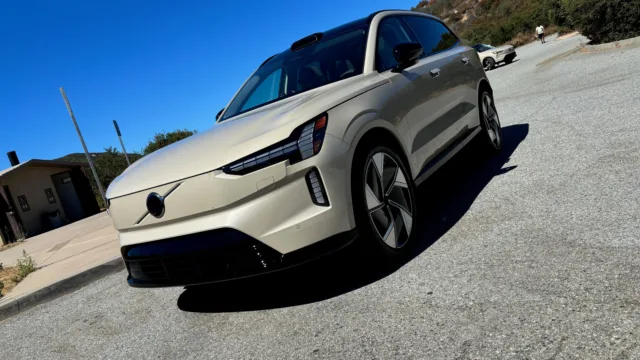Protectionism is the enemy of innovation, a Detroit auto executive told me recently, as we discussed how President Donald Trump’s policies threaten the industry at a time when carmakers must transition to new technology.
Automakers must be careful about saying things like this to avoid Trump’s wrath — which is our reality, even if it is a silly way to run a business and a country.
But, unless everybody who knows the auto industry is wrong, two huge truths loom for Detroit:
- Auto tech is moving rapidly toward electric cars. While politics has hampered U.S. progress, the dominance of EVs is as inevitable as was the adoption of cars a bit over a century ago. (This was doubted in the 1890s, at the peak of bicycle popularity in the United States. “The horseless carriage … will never come into as common use as the bicycle,” the Literary Digest declared in 1899, four years before the founding of Ford Motor Co.)
- China is producing affordable, advanced EVs, and quickly. While 100% tariffs imposed on these cars by then-President Joe Biden keep them out of the United States for now, it won’t last.

Missing out and falling behind
Ford Vice Chairman Jon Lawler put it bluntly at the Bank of America Securities 2025 Automotive Summit in May: “I don’t know what the timeframe is, but I don’t think we can say ‘no, they’re not going to come to the U.S.’”
Analysts agree.
Think of the Japanese invasion of the 1970s and ‘80s, but at the speed of 21st century commerce. From 1970 to 1990, Asian cars grew from about 3% of U.S. market share to 27%, at one point costing a third of U.S. autoworkers their jobs.
China last year produced 70% of the 17.3 million EVs manufactured globally. U.S. automakers produced only about 1 million. The auto industry is global — Ford, General Motors and Stellantis cannot count solely on U.S. sales to be successful companies. As our companies lag in EV advancement and production, they are already losing opportunities in other markets and in providing U.S. consumers with the best new technology.
The Trump administration is doing all it can to undercut U.S. EV development. Beyond its rhetoric echoing the 1890s, Trump froze money for charging infrastructure, and his massive tax and policy bill ends the federal tax incentive of up to $7,500 to buy an EV. Without that, demand, already short of projections, will drop further. If sales are too anemic, car companies will have no choice but to further de-emphasize EV research and development. As Trump vilifies EVs, bolsters oil companies and seeks an isolationist trade policy to force domestic auto production, the Chinese are building the world’s most advanced EVs and carving out global market share. The speed at which their EVs are being developed is, to Lawler and other U.S. executives, stunning and scary.
Self-inflicted wounds
Tesla CEO Elon Musk told industry analysts last year that Chinese EVs are so good, that without trade barriers, “they will pretty much demolish most other car companies in the world.” Chinese automaker BYD sells its Seagull for around $10,000.
We can be sure that American consumers will want the best tech at the best price. That’s one key lesson from the ‘70s and ‘80s. At that moment, American carmakers derided Japanese “econoboxes,” confident U.S. consumers wanted big cars even as gas topped $1 a gallon.
Many wanted better fuel economy instead — and discovered that the imports broke down less than American cars and lasted longer. My father, for example, who drove a couple hundred miles on many days, put a third of a million miles on a 1974 Toyota pickup, durability that was unheard of from an American car at the time.
When the Chinese EVs arrive — as Lawler and others say, that’s a question of when, not if — U.S. automakers will be far behind at the cost of billions of dollars and tens of thousands of jobs.
This isn’t a little pain for a greater outcome. It’s a needless self-inflicted wound that will leave the U.S. auto industry crippled and the Michigan and national economy wounded.
Trump, if his policies were actually meant to address working class needs, would incentivize the industry to speed its work in developing the cars that consumers will demand in only one or two automotive product cycles. The UAW, rather than putting its stake behind protectionism that is bound to fail, should embrace development of products that will protect its members’ jobs in the long run.
Randy Essex is a retired journalist who covered and edited business and political news, including at the Free Press, for four decades. Submit a letter to the editor at freep.com/letters, and we may publish it online and in print.
Like what you’re reading? Please consider supporting local journalism and getting unlimited digital access with a Detroit Free Press subscription. We depend on readers like you.








